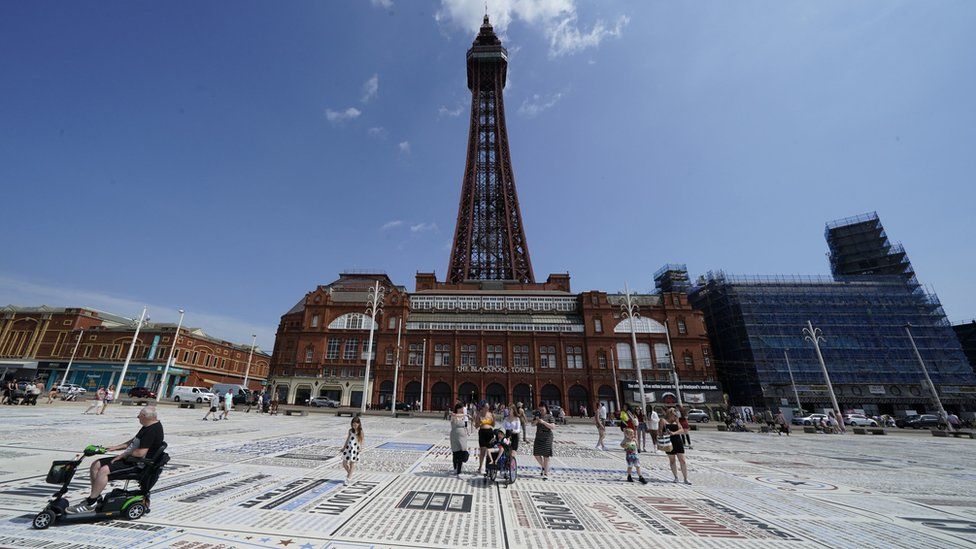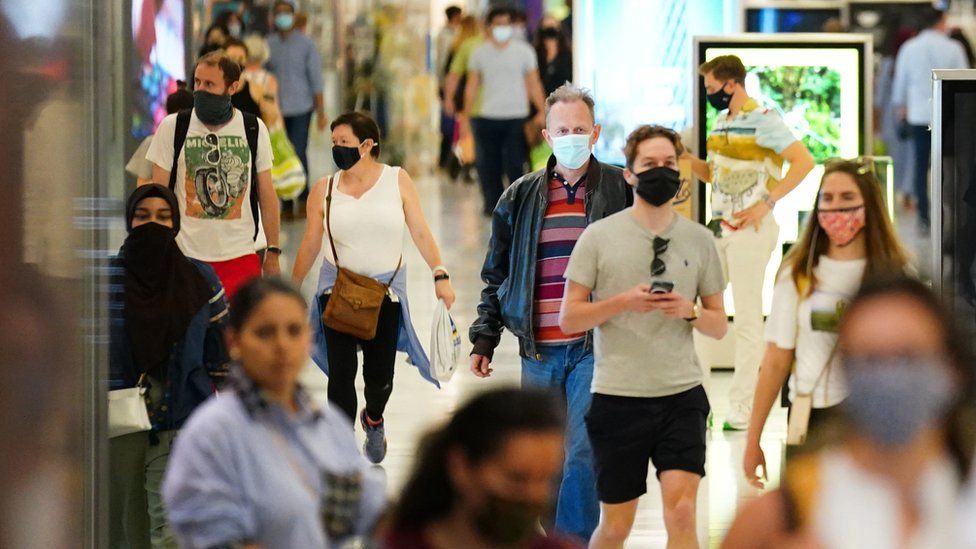
The level of footfall in a seaside resort since Covid restrictions were eased has been higher than it was before the pandemic, a study has found.
After restrictions were lifted in England, footfall in Blackpool rose to 120% of the town's pre-pandemic average, the Centre for Cities found.
The study also found Bournemouth hit 99%, but the UK average was about 50%.
The Federation of Small Businesses (FSB) said the figures "paint a very mixed picture".
The Centre for Cities used anonymised mobile phone data to gauge the number of people in town and city centres at different times of day.
'Recovering well'
The think tank said night-time visits in the centres of the UK's 63 largest cities and towns rose by 16% after restrictions were eased on 19 July.
Blackpool also topped that list with an increase to 132% of its pre-lockdown average, followed by Sunderland.
Michael Williams, chair of Blackpool BID, said most businesses in the town "seem to be recovering well" and he has seen increased visitor numbers "along the promenade and the town centre".
"Clearly, businesses do remain concerned about the future and many are reporting staffing shortages as employees have left the hospitality industry in favour of jobs in other sectors", he said.
However, he predicted that the extension of the annual illuminations would "hopefully give us the opportunity to recoup losses".

The report suggested many people remained reluctant to go back to their offices and less than one in five had returned to their city centre workplace.
Daytime worker footfall fell by 1% in the last week of July, it said.
Big cities also appeared to be lagging behind in terms of recovery, as London, Birmingham, Manchester and Glasgow all had less than half the number of pre-lockdown visitors.
Centre for Cities director of policy and research Paul Swinney, said people's "eagerness, particularly in cities in the North and Midlands, to go out and socialise has been a lifeline for many businesses in the night-time economy".
However, he added that a "reluctance to head back to the office in our largest and most economically important cities means that people in the so-called 'sandwich economy' that caters to city centre office workers are facing an uncertain future as we get ever closer to the end of the furlough scheme in September".
Mike Cherry, the FSB's national chairman said the footfall recovery in coastal areas was "great news, as these tend to be places where businesses rely on a strong summer's trading to get them through leaner winter months".
However, he said local government in places where footfall "has not shown much sign of recovering ought to reach out to local business networks, and see what is needed to revive high streets".
"Councils are still sitting on billions of pounds' worth of grants... that were supposed to reach hard-up firms months ago," he added.
"These figures paint a very mixed picture, and for those whose revenues are still severely depleted, those grants could make all the difference."

Related Internet Links
https://news.google.com/__i/rss/rd/articles/CBMiOWh0dHBzOi8vd3d3LmJiYy5jby51ay9uZXdzL3VrLWVuZ2xhbmQtbGFuY2FzaGlyZS01ODE3MDk4MNIBPWh0dHBzOi8vd3d3LmJiYy5jby51ay9uZXdzL3VrLWVuZ2xhbmQtbGFuY2FzaGlyZS01ODE3MDk4MC5hbXA?oc=5
2021-08-12 05:54:45Z
52781795053838
Tidak ada komentar:
Posting Komentar